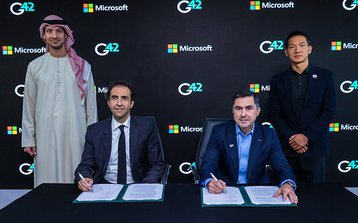Republican lawmakers in the US are asking the government to investigate Microsoft's $1.5 billion investment in G42.
In April, the companies announced a plan to co-develop and deliver AI solutions with Microsoft Azure to the Middle East, Central Asia, and Africa.
G42 is involved in a number of sectors, including healthcare, data analytics, cloud services, and even traditional data centers through its acquisition of UAE-based Khazna. Controlled by the National Security Advisor of UAE, Tahnoun bin Zayed Al Nahyan (the son of the founder of the UAE), the company has also been accused of developing spying tools for the state.
G42 is led by CEO Peng Xiao, who previously worked for DarkMatter, which is accused of being a state-surveillance-for-hire cybersecurity firm. There, he helped develop Pegasus, a spying software that was allegedly used by the Saudi Arabian government to hack journalist Jamal Khashoggi’s phone prior to his murder. G42 has denied a connection between the two companies.
The concerns cited by lawmakers in the US surround G42's historical ties to China.
Representative Michael McCaul, chair of the House Foreign Affairs Committee, and John Moolenaar, leader of the Select Committee on China, sent a letter to White House National Security Adviser Jake Sullivan regarding the matter.
The letter states: "This deal may be one of the most consequential investments by a US technology firm in the Middle East in decades, and as such, deserves continued special scrutiny by both the Executive Branch and our Committees to ensure that our strategic and national security interests are protected.
"Our Committees share the overarching goals of limiting the People’s Republic of China’s (PRC) influence, but we remain deeply concerned by attempts to move quickly to advance a partnership that involves the unprecedented transfer of highly-sensitive, US-origin technology, without Congressional consultation or clearly defined regulations in place."
It goes on to note that the UAE president and ruler of Abu Dhabi recently traveled to Beijing and reportedly discussed cooperation in artificial intelligence.
While in the first phase of the deal, Microsoft is intending to restrict the transfer of sensitive technology to G42, the second phase is currently in negotiations.
The letter further says: "Given the ties between the PRC and G42, as well as the PRC’s continued interests in the UAE, we ask that the National Intelligence Council prepare an official Intelligence Community assessment on the ties between G42, including its subsidiaries and affiliates, to the Chinese Communist Party, the People’s Liberation Army, or any part of the PRC’s apparatus, before this partnership proceeds further."
G42 is also spending $900 million to build nine AI supercomputers in the US with Cerebras mega-chips.
The US government has existing regulations in place that attempt to limit access to AI chip technology for China.
In June 2024, the Biden administration was reportedly looking to expand these restrictions further to potentially include Gate-all-around technology and high bandwidth memory chips.
Despite sanctions on chips, Chinese universities were reportedly still gaining access to semiconductors in January of this year.
As a result of the limitations, in September 2023 Reuters reported that the Chinese government was set to launch a third round of a state-backed investment fund that would raise approximately $40bn to support the country’s domestic semiconductor sector.
Microsoft has been involved in a slew of investigations. Earlier this month, the company settled a dispute with CISPE for almost $22 million regarding Microsoft's alleged unfair licensing of cloud products.
The company is also currently a part of anti-competitive investigations in the UK and the US.
In the UK, the CMA is conducting an investigation into the cloud computing market that kicked off in October 2023, while in the US the company is part of two investigations by the Federal Trade Commission.
The first commenced in January 2024 and is looking into AI services provided by companies including Amazon, Alphabet, Microsoft, Anthropic, and OpenAI, focusing on the investments and partnerships being formed.
The second probe focuses on Microsoft, OpenAI, and Nvidia and is looking at the companies' conduct and influence on the AI industry.
Earlier this month, Microsoft settled a $14.4m lawsuit with the Civil Rights Department regarding accusations that the company was discriminating against employees based on protected leave including parental, disability, pregnancy, and family care leave.






